Bolivians headed to the polls yesterday for a referendum that the president hopes will give the impoverished South American nation guidance on what to do with its immense natural gas reserves.
Despite protests by some 200 highland Indians, who burned tires and strewed rocks along main roads outside of the capital on Friday and Saturday, there was a general calm nationwide on the eve of the referendum as stores and transit operated normally.
President Carlos Mesa shrugged off the protests in El Alto, a city of 800,000 on the high plains above the capital, as "minuscule radical groups," during a news conference on Saturday.
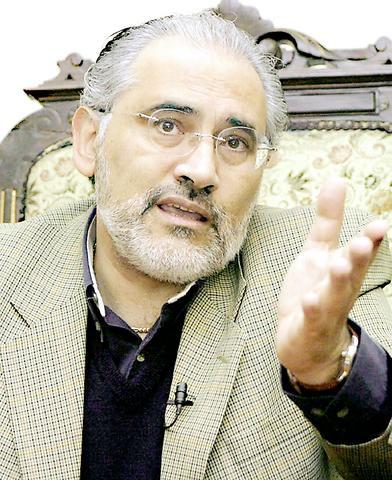
PHOTO: EPA
He also rejected suggestions that he step down if the referendum, mandatory for Bolivia's 4.4 million registered voters, fails to heal social wounds.
The referendum comes nine months after a popular revolt ousted former president Gonzalo Sanchez de Lozada for planning to export liquefied natural gas to Mexico and California.
Bolivia's constitution lifted Mesa from the vice presidency to serve out the remainder of Sanchez de Lozada's term through 2007. Mesa immediately offered the
referendum.
Valued at more than US$70 billion, the gas fields in this landlocked country are South America's richest after those in Venezuela.
The gas ought to be an economic watershed for Bolivia, one of the poorest nations on the continent, with one of the continent's highest proportions of Indians -- some 55 percent of the nation's 8.7 million people.
Lured by privatization of the industry, some 20 foreign companies have invested US$3.5 billion in exploration, discovering some 1.56 trillion meters3 of gas. That's enough by some estimates to cover Bolivia's needs for a thousand years and raise incomes in a nation where two-thirds of the population make less than US$2 a day.
But the reserves have split the nation, with Andean Indians in the western highlands at odds with business leaders of European descent in the eastern and southern lowlands. In the east and southeast, home to the gas reserves, business leaders are set on exportation and have threatened to secede from the less developed highlands.
Indigenous and labor leaders in the west want the entire gas industry nationalized -- an option Mesa left off the ballot.
"We totally reject this crooked referendum," said 60-year-old Luis Sanchez, standing in a brown felt fedora, sweater and slacks in El Alto on Saturday.
The ballot asks Bolivians five questions, among them whether the gas should be exported. It also asks whether Bolivia should use the gas reserves to negotiate for access to the Pacific coast lost during its 1879 to 1884 war with Chile.
Political analysts say the real test for Mesa will come in about six months. By then the Congress will have had time to start drafting legislation based on the outcome of yesterday's vote.
"One of the problems is that Bolivia is already exporting gas to Brazil and Argentina," said Fernando Molina, editor of weekly political newspaper Pulso.
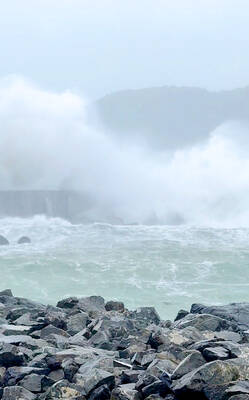
Heavy rain and strong winds yesterday disrupted flights, trains and ferries, forcing the closure of roads across large parts of New Zealand’s North Island, while snapping power links to tens of thousands. Domestic media reported a few flights had resumed operating by afternoon from the airport in Wellington, the capital, although cancelations were still widespread after airport authorities said most morning flights were disrupted. Air New Zealand said it hoped to resume services when conditions ease later yesterday, after it paused operations at Wellington, Napier and Palmerston North airports. Online images showed flooded semi-rural neighborhoods, inundated homes, trees fallen on vehicles and collapsed
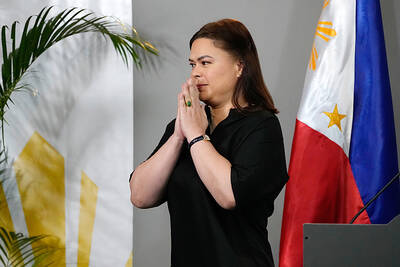
‘COST OF DEFECTION’: Duterte’s announcement could be an effort to keep allies in line with the promise of a return to power amid political uncertainty, an analyst said Philippine Vice President Sara Duterte yesterday announced she would run for president of the Southeast Asian nation of 116 million in 2028. Duterte, who is embroiled in a bitter feud with Philippine President Ferdinand Marcos Jr, was impeached last year only to see the country’s Supreme Court throw the case out over procedural issues. Her announcement comes just days before her father, former Philippine president Rodrigo Duterte, begins a pretrial hearing at the International Criminal Court (ICC) in the Netherlands over crimes against humanity allegedly committed as part of a brutal crackdown on drugs. “I offer my life, my strength and my future
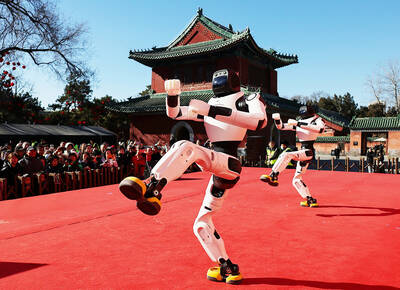
NOT YET THERE: While the show was impressive, it failed to demonstrate their ability to move in unstructured environments, such as a factory floor, an expert said Dancing humanoid robots on Monday took center stage during the annual China Media Group’s Spring Festival Gala, China’s most-watched official television broadcast. They lunged and backflipped (landing on their knees), they spun around and jumped. Not one fell over. The display was impressive, but if robots can now dance and perform martial arts, what else can they do? Experts have mixed opinions, with some saying the robots had limitations and that the display should be viewed through a lens of state propaganda. Developed by several Chinese robotics firms, the robots performed a range of intricate stunts, including martial arts, comedy sketches and choreographed
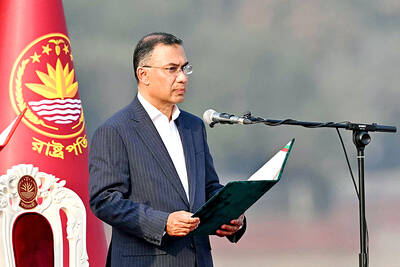
POST-UPRISING: Bangladesh Nationalist Party lawmakers were yesterday expected to formally elect Tarique Rahman as their leader and new head of government Bangladesh’s prime minister-to-be Tarique Rahman and lawmakers were yesterday sworn into parliament, becoming the first elected representatives since a deadly 2024 uprising. Rahman is set to take over from an interim government that has steered the country of 170 million people for 18 months since the autocratic government of Sheikh Hasina was overthrown. The lawmakers, who promised loyalty to Bangladesh, were sworn in by Chief Election Commissioner AMM Nasir Uddin. Bangladesh Nationalist Party (BNP) lawmakers are expected to formally elect Rahman as their leader, with President Mohammed Shahabuddin then to administer the oath of office to the prime minister and his ministers